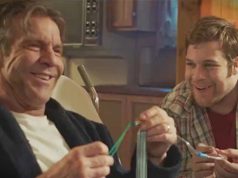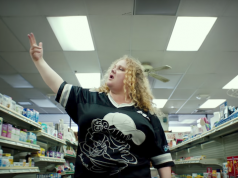Ian Curtis was such a mopey fellow that his story can only be told in black-and-white. In “Control,” director Anton Corbijn makes that elemental choice, and everything else seems to follow naturally. The perpetually gray skies of England seem all the more depressing. Ian’s ineffable sadness is more tangible. The melancholy is contagious.
And yet it is a beautiful film, in the way that sad things are sometimes beautiful. Ian Curtis was the lead singer of Joy Division, an influential Manchester band that helped shape the sounds of the new wave of British post-punk pop in the late ’70s and early ’80s. Joy Division’s most famous song was “Love Will Tear Us Apart,” in which Curtis’ deep baritone doesn’t even sound particularly good, musically speaking. It sure sounds convincing, though. You can almost hear the love tearing him apart.
“Control” starts in 1973 in the working-class town of Macclesfield, where Ian (Sam Riley) is 17 and already a moody, introspective poet type. Before you know it, he has swiped his mate’s girlfriend, Debbie (Samantha Morton), and married her just two months after his 19th birthday. He and Debbie are much too young. The film skips whatever courtship or falling-in-love process there might have been.
In 1978, Ian is working at a government employment office when he meets up with some local fellows and becomes the lead singer and lyricist for their new band. The ironic-sounding name of Joy Division is chosen, and their energetically gloomy songs gain the attention of British music impresario Tony Wilson (Craig Parkinson), who signs them to his label.
Those of you who know your pop-music history know that Ian’s story doesn’t end well. But even if you weren’t aware of the particulars, “Control” leaves no doubt that there will not be a sunny Hollywood ending. I don’t think Ian ever smiles in the film. He is plagued with epilepsy and undiagnosed depression, not to mention a wife he doesn’t particularly love. When he meets a Belgian journalist named Annik (Alexandra Maria Lara) and commences an affair with her, we get scenes of them talking and getting to know one another — things that were notably absent from his early relationship with Debbie.
It’s worth mentioning that this is not a story about a Joy Division, but about Ian Curtis specifically. The other three band members — Peter Hook, Stephen Morris, and Bernard Sumner — aren’t even identified by name, at least not enough to register as real characters.
This is Ian’s tale, full of sadness and sorrow, yet not oppressively dour. Nor is it whiny, the way you might expect a story about a 20-year-old poet-martyr to be. When Ian says, “Even the people who love me hate me,” you believe Sam Riley’s sincerity as an actor, as well as Ian’s genuine depression. He’s not just some needy kid looking for pity and attention. Where many biopic actors simply dress like the subject and re-enact his or her life, Riley truly conveys Ian’s heart and soul.
Anton Corbijn, primarily a music-video director, has given “Control” a low-key, do-it-yourself feel that matches Joy Division’s under-produced sound and Ian’s raw, unpolished poetry. With its focus on drab details and a protagonist seemingly incapable of being happy, the movie is an example of the “kitchen sink realism” that was once a major part of English films and art. In short, it seems like the kind of film Ian Curtis would have watched.
B (2 hrs., 1 min.; )





